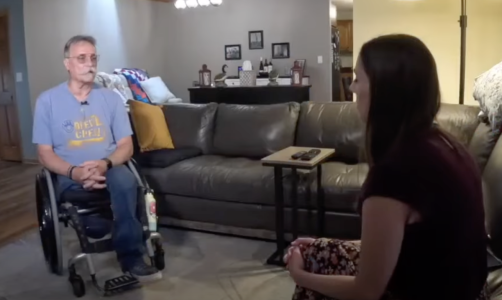Court ruling could mean back pay for disabled workers denied unemployment benefits
By
Veronica E.
- Replies 0
For years, disabled workers faced an unfair roadblock when applying for unemployment benefits.
Those who also received Social Security Disability Insurance (SSDI) were automatically excluded, leaving many without enough income to cover their basic needs.
Now, a federal judge has struck down that policy, ruling it discriminatory under the Americans with Disabilities Act.
The decision could result in payments to thousands of residents who were denied benefits over the past decade.
For many families, it’s a long-awaited step toward fairness and financial relief.
The ruling stems from a case in Wisconsin, where laws passed in 2013 and 2015 barred SSDI recipients from collecting unemployment benefits.

In 2013 and 2015, state lawmakers enacted laws that barred people from collecting both SSDI and unemployment insurance.
The reasoning was to prevent what was called “double dipping.”
But advocates argued this assumption ignored reality—many disabled individuals still worked and needed unemployment support when jobs were lost.
For nearly ten years, anyone receiving SSDI who applied for unemployment was automatically denied, regardless of their circumstances.
This summer, Judge William Conley of the Western District Court ruled that Wisconsin’s policy violated federal disability protections.
He noted the exclusion was based on stereotypes, not facts, and amounted to intentional discrimination.
“It is not at all obvious why those individuals were excluded,” Conley wrote, stressing that SSDI recipients are not barred from working and deserve equal treatment.
The order requires the Wisconsin Department of Workforce Development (DWD) to establish a process for reviewing and paying claims denied between September 7, 2015, and July 30, 2025.
New SSDI-related claims are already being accepted, thanks to an injunction issued earlier this year.
The bigger challenge will be tracking down and notifying people who were denied in the past decade.
That could mean thousands of residents may be eligible for back pay.
One of the plaintiffs, Tracy Long, shared her story.
Injured in 2019, she applied for unemployment but later received SSDI.
Instead of help, she was accused of fraud and asked to repay $1,500.
Long said joining the lawsuit was about standing up for others in similar situations, and she now feels “ecstatic” about the ruling.
Her experience reflects the frustration and financial hardship many have faced under the now-overturned policy.
The restrictions date back to legislation passed under former Governor Scott Walker.
Despite repeated efforts by current Governor Tony Evers to repeal the law, the Republican-led legislature kept the ban in place.
The DWD argued it was simply following the law as written, but the court found that federal disability rights overruled state statutes.
If you were denied unemployment benefits while receiving SSDI in Wisconsin between 2015 and 2025, you may be entitled to payments.
Steps to take include:
While this ruling applies to Wisconsin, it could influence similar cases elsewhere.
Several states maintain comparable restrictions, and legal advocates hope this decision sets a precedent for challenging them.
For those outside Wisconsin who have experienced the same issue, consulting a legal expert may be worthwhile.
Advocates say the ruling is a major win, but the work isn’t finished.
The DWD must process claims and provide compensation to all eligible individuals—a process that could take time.
Attorney Victor Forberger, who represented the class-action plaintiffs, emphasized that this is only the beginning: “There’s still a difficult process ahead, but this is a major step toward correcting years of unfair treatment.”
Read next: Are these health care providers facing a costly mistake? Here’s what they have to pay back now

If you think you or someone you know could be affected, now is the time to gather documents, ask questions, and seek guidance. This ruling is more than a court victory—it’s a reminder that fairness is possible when people stand up and fight for their rights.
Those who also received Social Security Disability Insurance (SSDI) were automatically excluded, leaving many without enough income to cover their basic needs.
Now, a federal judge has struck down that policy, ruling it discriminatory under the Americans with Disabilities Act.
The decision could result in payments to thousands of residents who were denied benefits over the past decade.
For many families, it’s a long-awaited step toward fairness and financial relief.
The ruling stems from a case in Wisconsin, where laws passed in 2013 and 2015 barred SSDI recipients from collecting unemployment benefits.

Residents share their experiences navigating the benefits system. Image Source: YouTube / FOX6 News Milwaukee.
A decade-long ban overturned
In 2013 and 2015, state lawmakers enacted laws that barred people from collecting both SSDI and unemployment insurance.
The reasoning was to prevent what was called “double dipping.”
But advocates argued this assumption ignored reality—many disabled individuals still worked and needed unemployment support when jobs were lost.
For nearly ten years, anyone receiving SSDI who applied for unemployment was automatically denied, regardless of their circumstances.
Also read: Shocking footage reveals healthcare worker's appalling act over disabled patient – see why she's facing charges!
The federal ruling
This summer, Judge William Conley of the Western District Court ruled that Wisconsin’s policy violated federal disability protections.
He noted the exclusion was based on stereotypes, not facts, and amounted to intentional discrimination.
“It is not at all obvious why those individuals were excluded,” Conley wrote, stressing that SSDI recipients are not barred from working and deserve equal treatment.
What happens next
The order requires the Wisconsin Department of Workforce Development (DWD) to establish a process for reviewing and paying claims denied between September 7, 2015, and July 30, 2025.
New SSDI-related claims are already being accepted, thanks to an injunction issued earlier this year.
The bigger challenge will be tracking down and notifying people who were denied in the past decade.
That could mean thousands of residents may be eligible for back pay.
Also read: A system under pressure: What’s changing at Social Security Administration?
The human impact
One of the plaintiffs, Tracy Long, shared her story.
Injured in 2019, she applied for unemployment but later received SSDI.
Instead of help, she was accused of fraud and asked to repay $1,500.
Long said joining the lawsuit was about standing up for others in similar situations, and she now feels “ecstatic” about the ruling.
Her experience reflects the frustration and financial hardship many have faced under the now-overturned policy.
Also read: Is your personal information being misused? How stolen identities are costing taxpayers billions
How it happened
The restrictions date back to legislation passed under former Governor Scott Walker.
Despite repeated efforts by current Governor Tony Evers to repeal the law, the Republican-led legislature kept the ban in place.
The DWD argued it was simply following the law as written, but the court found that federal disability rights overruled state statutes.
Also read: Are you making the most of your benefits? Some retirees qualify for all three—and don’t even realize it
What to do if you think you qualify
If you were denied unemployment benefits while receiving SSDI in Wisconsin between 2015 and 2025, you may be entitled to payments.
Steps to take include:
- Check your records for denial letters or DWD documentation.
- Contact the DWD for updates on the claims review process.
- Seek assistance from legal aid or disability advocacy groups if navigating paperwork feels overwhelming.
- Spread the word so others who qualify are aware of their rights.
Also read: Are you missing out? 15 legitimate ways to claim free money from the government
A precedent for other states
While this ruling applies to Wisconsin, it could influence similar cases elsewhere.
Several states maintain comparable restrictions, and legal advocates hope this decision sets a precedent for challenging them.
For those outside Wisconsin who have experienced the same issue, consulting a legal expert may be worthwhile.
Moving forward
Advocates say the ruling is a major win, but the work isn’t finished.
The DWD must process claims and provide compensation to all eligible individuals—a process that could take time.
Attorney Victor Forberger, who represented the class-action plaintiffs, emphasized that this is only the beginning: “There’s still a difficult process ahead, but this is a major step toward correcting years of unfair treatment.”
Read next: Are these health care providers facing a costly mistake? Here’s what they have to pay back now
Key Takeaways
- A federal court found Wisconsin’s ban on SSDI recipients receiving unemployment benefits violated the ADA.
- The Wisconsin Department of Workforce Development must pay back claims dating from September 2015 through July 2025.
- Thousands of residents may be eligible for compensation, and advocates urge people to check records and contact the DWD.
- The ruling may set a precedent for other states with similar laws that restrict benefits for disabled workers.
If you think you or someone you know could be affected, now is the time to gather documents, ask questions, and seek guidance. This ruling is more than a court victory—it’s a reminder that fairness is possible when people stand up and fight for their rights.






